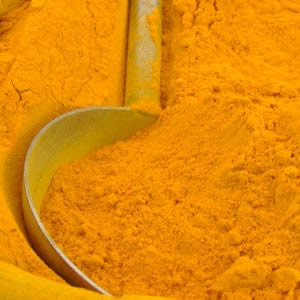Alzheimer’s is the most common form of dementia, a general term for memory loss and other intellectual abilities serious enough to interfere with daily life. This disease, is due, in part, to the accumulation of amyloid, a protein, in the brain. Oxidative damage and inflammation are also associated with the progression of Alzheimer’s disease (AD).
Curcumin
A plant cultivated mostly in Asia, turmeric is a member of the ginger family. Curcumin (diferuloylmethane) is the yellow pigment in the spice turmeric. Curcumin is one of 3 curcuminoids of turmeric. The other two curcuminoids are bisdemethoxycurcumin and demethoxycurcumin.
Curcumin and Alzheimer’s Disease
Despite India being one of the most populated countries in the world, it has one of the lowest occurrences of Alzheimer’s disease. Epidemiological studies have shown that prevalence of Alzheimer’s disease is 4.4 less amongst Indian Asians as compared to people of western origin. It is thought for this reason that India, a region in which the consumption of curcumin is particularly high, has some of the lowest Alzheimer’s disease rates in the world. Researchs suggests that turmeric (curcumin) may afford protection against neurodegenerative diseases. Curcumin as an anti-inflammatory, antioxidant, and lipophilic action improves the cognitive functions in people with Alzheimer’s disease.
Amyloid protein plaque buildup is one of the primary factors that characterizes Alzheimer’s disease. Curcumin reduced plasma contents of beta-amyloid protein, a marker of brain aging, particularly in relation to AD. A study reported in the Nov 2001 edition of the “Journal of Neuroscience” found, that curcumin, reduces brain cell damage and inhibits the formation of protein plaques. Curcumin, decreases the harmful effects of protein plaques in the brains of Alzheimer’s patients according to a research reported in the Sep 2010 Journal of Biological Chemistry. The levels of beta-amyloid in  Alzheimer’s disease mice that were given low doses of curcumin were reduced by 40 percent in comparison to those that were not treated with curcumin. Also, low doses of curcumin caused a 43 percent reduction in the so-called “plaque burden” that these beta-amyloid have on the brains of AD mice. A study reported in the Feb 2005 edition of The Journal of Biological Chemistry demonstrated that curcumin inhibits the formation of neurofibrillary tangles, which are collections of beta-amyloid protein, in both tissue culture and in animal models of AD. In one study, scientists compared the effects of rosmarinic acid and curcumin on the formation, extension, and destabilization of beta amyloid fibrils. They found that both rosmarinic acid and curcumin inhibited the formation and extension of beta amyloid fibrils, and destabilized beta amyloid plaques that had already formed.
Alzheimer’s disease mice that were given low doses of curcumin were reduced by 40 percent in comparison to those that were not treated with curcumin. Also, low doses of curcumin caused a 43 percent reduction in the so-called “plaque burden” that these beta-amyloid have on the brains of AD mice. A study reported in the Feb 2005 edition of The Journal of Biological Chemistry demonstrated that curcumin inhibits the formation of neurofibrillary tangles, which are collections of beta-amyloid protein, in both tissue culture and in animal models of AD. In one study, scientists compared the effects of rosmarinic acid and curcumin on the formation, extension, and destabilization of beta amyloid fibrils. They found that both rosmarinic acid and curcumin inhibited the formation and extension of beta amyloid fibrils, and destabilized beta amyloid plaques that had already formed.
Alzheimer’s begins as an inflammatory process in the brain. Curcumin has a strong anti-inflammatory activity. Through its different anti-inflammatory properties, it may have a role in the treatment of Alzheimer’s disease. In a 2001 study, UCLA scientists fed groups of mice one of 2 different doses of curcumin as part of their normal diet. The scientists wanted to determine how each dose affect inflammation, oxidative damage, and cerebral plaque levels. After 6 months, brain biopsies were performed to evaluate any changes in the architecture of the tissue. Both doses of the curcumin were effective. The findings demonstrated that, compared with mice fed the normal diet, had a decreased in 2 markers of inflammation in the brain.
Researches demonstrated that metals can induce A-beta aggregation and toxicity and are concentrated on Alzheimer’s brain. A study at “Capital University Beijing” showed the toxicity of copper on neurons. Curcumin, by interaction with heavy metals such as lead and cadmium prevents neurotoxicity caused by these metals. A study at “Chinese University of Hong Kong” demonstrated that by using spectrophotometry, the curcumin effectively binds to copper, iron and zinc. Also, curcumin binds more effectively with redox-active metals such as copper and iron than the redox-inactive zinc. The intraperitoneal injection of lead acetate in rats in the presence of curcumin was investigated microscopically. The research findings show lead-induced damage to neurons was significantly decreased in rats injected with curcumin.
Curcumin and Vitamin D3
Vitamin D3 together with curcumin, may stimulate the body’s immune system to clear amyloid beta from the brain. A study conducted at UCLA found that curcumin may help the macrophages to clear the amyloid plaques found in Alzheimer’s disease. When paired with vitamin D, curcumin may help protect against Alzheimer’s disease. Like curcumin, vitamin D may also exert some of its beneficial effects on Alzheimer’s through its anti-inflammatory and immune-boosting properties. A study, revealed that vitamin D3 together with curcumin may help stimulate your immune system to clear your brain of amyloid beta, thereby helping to prevent Alzheimer’s.
Leave a Reply